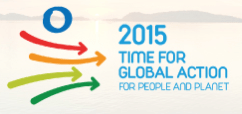 21 April 2015: The intergovernmental negotiation process on the post-2015 development agenda convened for a joint meeting with the preparatory process for the Third International Conference on Financing for Development (FfD 3). The post-2015 process’ fourth session, meeting from 21-24 April 2015, is dedicated to means of implementation (MOI) and global partnership for sustainable development.
21 April 2015: The intergovernmental negotiation process on the post-2015 development agenda convened for a joint meeting with the preparatory process for the Third International Conference on Financing for Development (FfD 3). The post-2015 process’ fourth session, meeting from 21-24 April 2015, is dedicated to means of implementation (MOI) and global partnership for sustainable development.
Opening the joint session on 21 April 2015, in New York, US, Post-2015 Co-Facilitator David Donoghue, Permanent Representative of Ireland, emphasized “universality” and “ambition” as the two key words for the meeting, stressing the universal nature of the Sustainable Development Goals (SDGs) as an agenda that is “for all and by all,” along with the high standards countries have set for themselves. He encouraged delegates to consider what kind of new institutions, policy changes, renewed and strengthened partnerships, and follow-up are needed. He also called for considering the link between the FfD 3 outcome, and each of the 70 SDG targets on MOI.
Macharia Kamau, Permanent Representative of Kenya and Post-2015 Co-Facilitator, added a “reality check,” citing recent news that highlights inequalities among countries – the death of 900 African and Arab people attempting to migrate to Europe – and within countries – the incarceration of 1.5 million black men in the US. He also referred to the Group of 20 (G20) commitment to complete 1,000 structural policy reforms in two years, and called on countries to never again question the feasibility of achieving 17 SDGs and 169 targets in 15 years. Kamau stressed that the agenda is doable, given the political will to deliver on it.
FfD Co-Facilitator George Talbot, Permanent Representative of Guyana, said Rio+20 “embedded sustainability as an enduring feature of the future,” and that FfD 3 seeks to provide a platform for specific deliverables on that. He stressed the need to carefully calibrate and design a follow-up process and the importance of sustained and strong political leadership from multiple sources. Talbot highlighted increased investment in infrastructure, agriculture, SMEs, social protection, health services, education, and access to energy, as key deliverables of the post-2015 development agenda, which were identified in last week’s FfD meetings as having transformative potential. He also called for a stronger focus on technology.
FfD Co-Facilitator Geir Pedersen, Permanent Representative of Norway, called for political leaders to show commitment not only to principles but also to their financing and MOI. He said the World Bank and International Monetary Fund (IMF) want to take the lead in “what they are best at” – mobilizing financial resources – while the job for governments at this week’s meeting is to establish the necessary political framework, and “be real diplomats” by finding solutions where they have not been found before.
On 22 April the joint meeting will take up technology facilitation along the lines of a paper prepared by the Secretariat, Donoghue noted. [IISD RS Sources] [IISD RS Meeting Coverage] [IISD RS Story on Technology Facilitation Background Note ]